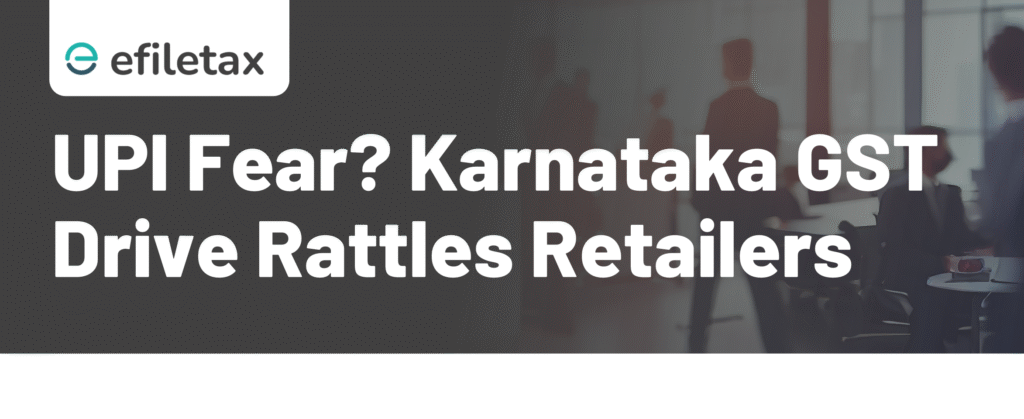
Karnataka GST notices spark panic among small traders
The phrase Karnataka GST evasion notices has suddenly made headlines—and small shopkeepers in Bengaluru and other districts are now refusing UPI payments. Why? Because GST officers are reportedly using digital payment data to track unreported turnover.
But is this fear justified? What does the law actually say? And how can small traders protect themselves without shutting down UPI?
Let’s break it down.
Why are shopkeepers rejecting UPI in Karnataka?
According to media reports and traders’ associations, GST officers in Karnataka have issued hundreds of show cause notices to small businesses based on UPI transaction history. Even roadside vendors have received queries about their income.
Key concerns raised:
- Mismatch in turnover declared vs. digital collections
- Assumptions of GST liability based on UPI volumes
- Fear of departmental scrutiny and penalties
As a result, many shopkeepers are now saying: “Cash only, no UPI.”
GST registration: What the law really says
As per Section 22 of the CGST Act, 2017, GST registration is mandatory if:
- Annual turnover exceeds ₹40 lakh for goods
- ₹20 lakh for services (₹10 lakh in special category states)
The mode of payment—cash, card, UPI—does not matter. What matters is aggregate turnover.
Key clarification:
Merely collecting payments via UPI does not automatically trigger GST liability unless you cross the prescribed turnover limit.
However, if you’re not issuing proper bills or hiding income while collecting digitally, that can be used as evidence of suppression.
What triggered GST evasion notices in Karnataka?
Based on local reports:
- Data from NPCI or banks was not accessed directly by GST officers.
- Notices were mostly based on complaints, field visits, or mismatch in compliance filings.
- In some cases, QR codes linked to personal savings accounts (not business accounts) raised red flags.
CBIC has not issued any blanket order against UPI payments. But officers do have powers under Section 61 and Section 67 to inspect or call for records if evasion is suspected.
Expert tip: Don’t fear UPI, fix your books
Instead of fearing digital payments, ensure:
- You record all sales—whether cash or UPI
- Use a proper billing system or POS app
- File accurate GSTR-1 and GSTR-3B returns
- Open a separate business bank account
- Maintain a cash book and bank ledger matching your filings
Chartered Accountants advise that digital trail helps prove your compliance—only if your records are clean.
How to respond to a GST notice in Karnataka
Received a notice? Here’s what to do:
- Don’t panic or ignore it
- Read the Section under which it’s issued (e.g., Sec 61, 65, 67)
- Consult your CA or tax expert immediately
- File a timely reply with explanations and documents
- If wrongly accused, request for personal hearing under Section 75(4)
Compliance guide for small traders using UPI
| Requirement | Must Do |
|---|---|
| GST Registration | If turnover exceeds ₹40L/₹20L |
| UPI Usage | Allowed even without GST registration |
| Billing | Issue invoice if GST registered |
| Bank Accounts | Prefer business account, not savings |
| Record Keeping | Maintain sales register, UPI ledger |
| Monthly GST Return | File GSTR-1 and GSTR-3B if applicable |
One wrong move: Using UPI without disclosure
If you’re not registered under GST but consistently collect large sums via UPI, it may trigger suspicion.
Karnataka GST officers are increasingly using data triangulation:
- GSTR filings vs
- Bank Statements/UPI trail vs
- Actual business activity
If discrepancies arise, notices follow.
Final Word: Don’t go cash-only, go compliant
Going “cash only” to avoid GST scrutiny is short-sighted. It can:
- Hurt your business credibility
- Limit growth and finance options
- Trigger income tax inquiries under Section 68/69 of the IT Act
Instead, get registered if required, file returns on time, and maintain clean records—whether you’re a chai stall or a boutique.
CTA:
Running a small business in Karnataka and worried about GST notices? Let Efiletax help you stay compliant, handle notices, and set up digital billing the right way.
👉 Talk to an expert at Efiletax
FAQ: Karnataka GST UPI Notices
Q1. Do I need GST registration if I accept UPI?
No. GST registration depends on turnover, not payment mode.
Q2. Can GST officers access my UPI data?
Only if required during an investigation or audit—not by default.
Q3. I received a GST notice, but my turnover is below limit. What should I do?
Reply with proper documents. Take help from a CA or Efiletax expert.
Q4. Can I use UPI for business without GST registration?
Yes, but keep your total turnover below the threshold and maintain records.
Summary
Karnataka GST evasion notices have led shopkeepers to avoid UPI, fearing tax scrutiny. But UPI alone doesn’t trigger GST registration. Learn how to stay compliant, respond to notices, and keep digital payments without penalty. Efiletax explains the rules, risks, and smart practices for small businesses.